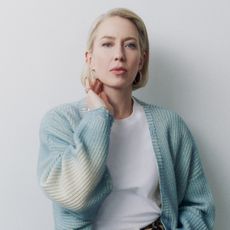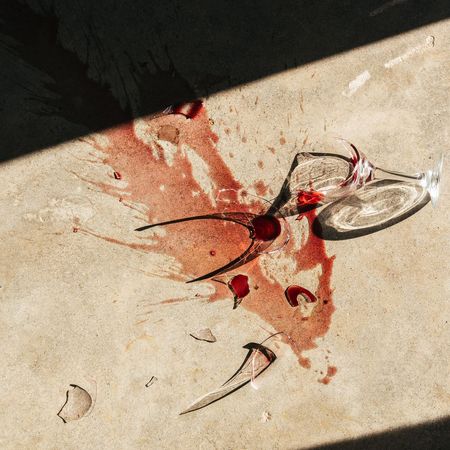Analyze This
Your 401(k)'s gone, your ex is back, your boss owns you, and you don't even own your apartment. Oh, and your mother's calling. Think you can't spare the time — or the bank — for therapy? Think again. It may be the best investment you'll ever make.

THERAPY PRO: Therapy turned my life around
By Lorna Martin
It was the same day that my therapist, Dr. J., asked if I was feeling envious or resentful toward my sister and her seemingly perfect life — her handsome physician husband, the big house in the suburbs, and now their 18-month-old miracle baby — that I began to realize I may have been deluding myself just a smidge.
"Ab. So. Lute. Ly. Not!" I responded. The thought that I, a 35-year-old, successful, self-sufficient woman, could feel jealous and bitter toward my sister (to whom I'd always felt superior, if I'm being honest) over an infant I loved more than anything was unconscionable.
But later that evening I called my mother, who was at my sister's — again — for dinner. I asked if she'd read an article I'd written for the London Observer. She said she'd only skimmed it because she'd been so busy "looking after the beautiful big boy." I then spoke to my dad, a hitherto emotionally reticent man. "All well?" he asked me — but before I could reply, I heard applause and squeals of delight through the receiver. Apparently, little Lewis had just put his empty yogurt carton in the trash bin, all by himself. My dad sounded close to tears.
I poured myself an extra-large glass of sauvignon blanc and lay down on my living room floor. You are a strong, confident, independent woman, I told myself. You are not jealous of a small child. Or his goddamn mother.
Several months earlier I'd had a breakdown at Gatwick Airport. I'd missed my third flight in 10 days, and as the gate closed, I burst into tears. It was early morning and I had to wait three hours for the next flight, so I went to the bar, ordered a strong gin and tonic, and, still weeping, reflected. In addition to the missed flights and lateness at work, I was binge drinking, often downing a bottle of wine when I was home alone and twice as much when I was out with friends. And I cried all the time. Like an overtired toddler, I sobbed in my boss's office for no reason — likewise with HR, at the pub with my friends, in the gym locker room, in my bed at 2, 3, and 4 in the morning. But worst of all, I was behaving like a maniac toward a married man I'd been dating, declaring my undying love for him and begging him to leave the other other woman.
Stay In The Know
Get exclusive access to fashion and beauty trends, hot-off-the-press celebrity news, and more.
Now, I've always been skeptical about therapy. For one, I'm Scottish. My countrymen, unless intoxicated, would rather eat deep-fried kitten than talk about their emotions. In the past, to help me through troughs, I'd relied on fresh air, friends and family, swimming, pulling up my socks, the antidepressants I took briefly when I turned 30, counting my blessings, escaping into a good book, listening to ABBA. But that day at the airport, none of those things held any allure. I felt as if I had run out of energy, out of coping strategies, out of hope. I'd crashed. I called a friend and got the number of the best psychotherapist in town.
Read --> for tips on finding the perfect shrink.
To my surprise, at my first appointment, Dr. J. didn't welcome me with a warm embrace, a heartfelt smile, or a pledge to make everything better. Like the Hollywood caricature of a shrink, she sat in silence, looking at me inscrutably. It felt weird, uncomfortable, frustrating. I'd thought she'd be Mother Earth, but the initial impression was of Helen Mirren in The Queen.
I started nervously yammering about the events of my life. And yammering, and yammering. Three months later I began to actually talk about my feelings, exploring the recesses and discovering emotions that had been too uncomfortable for me to acknowledge: anger, envy, shame, fear, guilt, loneliness, disappointment. I began to understand how childhood experiences influenced me. I learned how a person can both long for and fear intimacy and why I'd always found unavailable men more desirable than those willing to commit. I also learned that even if I constructed the perfect life, with the stellar career, the genius guy, the shabby-chic apartment, and the fabulous friends, happiness wouldn't necessarily follow.
So am I cured? Of course not. There's no cure for being human. But I'm happier than I've ever been, because I'm equipped to handle the challenges that are a part of living. And when my sister inevitably reveals another miracle baby is coming, I don't have to feel bad about feeling a little bad. I can just have a sip of champagne and accept myself, neuroses and all.
THERAPY CON: I learned more in six months scooping horse dung than in 10 years of therapy
By Justine van der Leun
I began my adventures in therapy at 12, during my parents' divorce, and ended them at 25, in a barn.
I first visited a hefty Freudian who commanded the room from a leather armchair as I squirmed on a metal stool. Why the seating arrangement? "Because I'm the doctor," he boomed, "and you, the patient." By 13, I had moved on to the woman who avoided eye contact, instead staring at a point just above my head. After her, there was the professor who kept an empty cottage-cheese container by his seat and whose thin slacks revealed an outline of testicle.
"He comes highly recommended," my mother insisted.
Read --> to find out if you need to dump yours.
Next up: The fellow who revealed nothing ("Do I have a cat? Well, how would that make you feel if I did?") and the woman who revealed too much ("Sometimes I dream of kissing my twin sister; does that mean I'm a lesbian narcissist?"). I liked the idea of therapy, with its promise of clarity, but with "help" like this, it wasn't helping.
Then I moved to a friend's farm for a year. In New York City, everyone's in treatment; on sheep farms, not so much. So I took a talk-therapy hiatus. I spent my days sweeping the barn and looking through a pile of potatoes for the good ones. The people I befriended did not discuss their mothers' flaws. They did not say things like, "My parents bought me this million-dollar loft to control me!" And yet, despite living relatively unexamined lives, they were not seething balls of rage. Many were ... content. More shocking, so was I. Sometime between scooping horse poop and painting the potato cellar, I noticed that after years of chatter, my internal radio had lost reception. Thoughts of the past and the future weren't tormenting me. Isn't that the kind of peace my insurers had been paying $125 an hour for?
I still like the idea of therapy. But I know that many people use self-examination to justify stagnation. Besides, shrinks are just human beings, and frankly, some of them are one Froot Loop shy of a full bowl. For me, the best palliative for life's stresses lies not in connecting my insecurities to how I feel about a doctor's hypothetical cat, but in moving around in the open air. Simply put, I needed the shutting-up cure.
TAKE OUR QUICK QUIZ: DO YOU NEED THERAPY?
NEXT PAGE >> How to Speak Psychobabble and The Shrink-O-Meter
HOW TO SPEAK PSYCHOBABBLE
In therapy, you learn what ails you and — bonus! — you can figure out what's wrong with everybody else, too. Here's a handy guide to using shrink lingo off the couch.
When your ne'er-do-well sister says she's worried about your freewheeling lifestyle, she's not concerned; she's projecting.
When your boss rips you for a pitch she calls the worst she's seen in 20 years, then adds that your skirt is cute, she's not a bitch; she has borderline personality disorder.
When your ex, on whom you cheated repeatedly, says you were the best girlfriend he ever had, he's not an amnesiac; he's fantasizing the lost object.
When your roommate gets drunk and sleeps with her professor, she's not a slut; she has fatherhood abandonment issues.
When your new boyfriend stalks you, he isn't a creepy psycho; he has a fearful-avoidant attachment style. But you should still dump him.
SHRINK-O-METER:
Our Favorite Pop-culture Shrinks, in Descending Order of Hotness
Dr. Paul Weston (Gabriel Byrne), In Treatment
Can you say "erotic transference"?
Dr. Jonathan Crane (Cillian Murphy), Batman Begins
Burlap mask = scary-hot!
Dr. George Huang (B.D. Wong), Law & Order: SVU
Expert witness; voice of reason; cutie.
Dr. Tyrone C. Berger (Judd Hirsch), Ordinary People
Tough love in a cozy cardigan.
Dr. Frasier Crane (Kelsey Grammer), Frasier
A face for radio, but we love him anyway.
Dr. Leo Marvin (Richard Dreyfuss), What About Bob?
Does it with hand puppets.
Dr. Tobias Fünke (David Cross), Arrested Development
Can you say "never-nude"?
Dr. Hannibal Lecter (Anthony Hopkins), Silence of the Lambs
Loves us for our brains.
RUNNING INTO MY SHRINK AT THE MALL
By Matt Passet
ME: Oh, hi! Dr. Erving...
[Dr. Ervingnods]
ME: I didn't think I'd see you here ... I just, I mean, I wasn't assuming you wouldn't be at the mall ... not because of anything about you or your clothes, but because I try not to assume things about people. I was just going to the drugstore, actually. I need some toilet paper and soap ... I mean, I'm not totally out of toilet paper ... I'm not irresponsible like that ... I'm just planning ahead ... I have to start planning ahead, right? ... Cuz we always discuss that I need to...
DR. ERVING: Mm-hmm...
ME: So, yup, just the drugstore, and then that's it for today ... Well, I might see my parents for dinner later on. If I want to. I'll see them if I want to. Not if my mom wants me to. If I want to see them, I will. But I don't have to. Should I not go? I should go.
[Dr. Erving nods and looks down at his watch]
ME: But I feel good, I guess ... doing well ... feeling alright, because I control how I feel.
[Dr. Erving looks down at his watch again]
ME: Guess you probably have to get going...
DR. ERVING: Yes, I really should be running along.
ME: Right, of course ... I understand you're busy. Just the toilet paper, which I don't need need, and then maybe, mayyybe dinner with my parents.
DR. ERVING: Have a good day.
ME: Of course. A good day. I can do that. Thank you, doctor!
FINDING DR. RIGHT
What are the options?
If your troubles run deep, psychodynamic therapy (Freud's baby) focuses on intimate relationships and hidden feelings to achieve change through insight, but it can mean years of work.
For anxieties and phobias, cognitive behavior therapy is more structured and focused (you'll spend less time in the past) and involves months, rather than years.
To manage stress, lose weight, quit smoking, or deal with physical or emotional pain, a few sessions of hypnosis will often do the trick.
WHAT DO THE DEGREES MEAN?
An M.D. can prescribe medication, and many do little else.
A Ph.D. spent at least four years in grad school and has ample clinical experience.
An MSW or a CSW (master of social work or certified social worker) spent two to three years on graduate study (including in a clinical setting).
WHERE DO YOU FIND HER/HIM?
Ask a friend or a relative whose life was improved by therapy — but don't see the same therapist. Just ask him or her for a referral.
THERAPY DEAL-BREAKERS
You should dump your shrink if he or she...
wears a toupee.
diagnoses the other people you talk about.
decorates with framed Anne Geddes posters.
has a catchphrase.
pokes you on Facebook.
won't prescribe happy pills.
blogs.
gives you his/her psychic's card.
refuses to make eye contact.
refuses to break eye contact.
calls you by the wrong name.
has been treating Courtney Love for a decade.
wears those milky Marilyn Manson contact lenses.
has a vanity plate that says DR-CRZY.
twitters during your session.
catches up on sleep while you talk.
smells like patchouli.
suggests "hugging it out."
has copies of Juggs in the waiting room.
has an office at the Celebrity Center.
moonlights as a fry cook at McDonald's.
has track marks.
wears clogs.
slept with your husband.
TAKE THIS QUICK QUIZ: Do You Need Therapy?
Dedicated to women of power, purpose, and style, Marie Claire is committed to celebrating the richness and scope of women's lives. Reaching millions of women every month, Marie Claire is an internationally recognized destination for celebrity news, fashion trends, beauty recommendations, and renowned investigative packages.
-
 The Wild Ride of Carrie Coon
The Wild Ride of Carrie CoonLaurie's deep-set insecurities come to a head in episode 7 of 'The White Lotus,' allowing the actress to turn a "dark night of the soul" into an illuminating time.
By Jessica Goodman Published
-
 Joshua Jackson Won't Let His Daughter Watch 'Dawson's Creek'
Joshua Jackson Won't Let His Daughter Watch 'Dawson's Creek'"She's going to get all sorts of ideas."
By Amy Mackelden Published
-
 Why Kate and William Will Be Making More Joint Appearances
Why Kate and William Will Be Making More Joint AppearancesA royal expert weighed in on their plans, calling them "the world's most glamorous royal couple."
By Amy Mackelden Published
-
 Senator Klobuchar: "Early Detection Saves Lives. It Saved Mine"
Senator Klobuchar: "Early Detection Saves Lives. It Saved Mine"Senator and breast cancer survivor Amy Klobuchar is encouraging women not to put off preventative care any longer.
By Senator Amy Klobuchar Published
-
 I'm an Egg Donor. Why Was It So Difficult for Me to Tell People That?
I'm an Egg Donor. Why Was It So Difficult for Me to Tell People That?Much like abortion, surrogacy, and IVF, becoming an egg donor was a reproductive choice that felt unfit for society’s standards of womanhood.
By Lauryn Chamberlain Published
-
 The 20 Best Probiotics to Keep Your Gut in Check
The 20 Best Probiotics to Keep Your Gut in CheckGut health = wealth.
By Julia Marzovilla Published
-
 Simone Biles Is Out of the Team Final at the Tokyo Olympics
Simone Biles Is Out of the Team Final at the Tokyo OlympicsShe withdrew from the event due to a medical issue, according to USA Gymnastics.
By Rachel Epstein Published
-
 The Truth About Thigh Gaps
The Truth About Thigh GapsWe're going to need you to stop right there.
By Kenny Thapoung Published
-
 The High Price of Living With Chronic Pain
The High Price of Living With Chronic PainThree women open up about how their conditions impact their bodies—and their wallets.
By Alice Oglethorpe Published
-
 I Used to Imagine Murdering the Men I Dated
I Used to Imagine Murdering the Men I DatedFalling in love helped me finally figure out why.
By Jessica Amento Published
-
 60 Workout Apps for Women Who Want Results (Without a Gym Membership)
60 Workout Apps for Women Who Want Results (Without a Gym Membership)Buying Guide Easy fitness plans you can follow without fear of judgment.
By Bianca Rodriguez Published